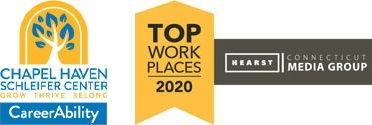Career Advisement and Assessment at CareerAbility
 Everyone deserves to find a role from which they can contribute to society, but finding that role can be a daunting undertaking. How do we fit the entirety of our personhood into a neat title or field? Sometimes the search becomes complicated by systemic barriers and inequalities.
Everyone deserves to find a role from which they can contribute to society, but finding that role can be a daunting undertaking. How do we fit the entirety of our personhood into a neat title or field? Sometimes the search becomes complicated by systemic barriers and inequalities.
In this article, we take a closer look at how CareerAbility works with individuals to find meaningful employment. Career Development Advisor, Sarah Elsdon, explains the process of career advisement that she goes through with each person entering CareerAbility’s employment services:
In the CareerAbility program, we invest a great deal of time getting to know future employees as individuals to support their journey to find meaningful employment. Career Development Advisor, Sarah Elsdon, explains the process of career advisement she goes through with each person entering CareerAbility’s employment services: “I let the individual direct the process. We help you figure out what you want and how to make those goals tangible.”
The personalized approach at CareerAbility allows staff to work collaboratively with individuals to achieve their goals.
To start, individuals participate in an assessment period, completing a variety of career assessments to examine their learning style, skill set, career interests, and professional social skills. Individuals are also observed in their everyday lives to understand their daily living skills, social communication, self-advocacy, and much more. Interviews are conducted with family and support team members to gain a well-rounded picture of who the future employee is and what they do best. All of this information is analyzed to develop a personalized career plan. This plan informs the entire process towards job placement, and ensures all employment services are individualized.
CareerAbility’s mission is to help individuals find meaningful employment, where they are paid competitively and feel good about what they do. Individuals engage in career advisement through employment services to set goals, reflect about their experiences, and become more self-aware. They direct the process with support and guidance.
Here are a few sample self-reflection questions an individual may consider when getting started in this process:
• What do you do in your free time? What do you like about the activities?
• What do you want to learn more about?
• Do you prefer to work alone or with others or a little of both?
• What tasks can you perform independently? What tasks do you struggle with?
• Do you have sensory sensitivities?
• Why do you want to work or get a new job? Where do you see yourself in five years?
The assessment and advisement processes key to understand the individual and tailor the job search to that person. Many times, this leads to pursuing customized employment for a job seeker. Through Customized Employment, the relationship between employee and employer is personalized in a way that meets the needs of both, according to the Department of Labor. Opportunities are sought with the individual in mind, rather than attempting to fit an individual to a prescribed job.
Look out for a new article next week when we discuss Facilitated Discovery, the next step towards job placement, when future employees use what they’ve learned about themselves to try Lout jobs first hand and gain new insights into who they are as workers



